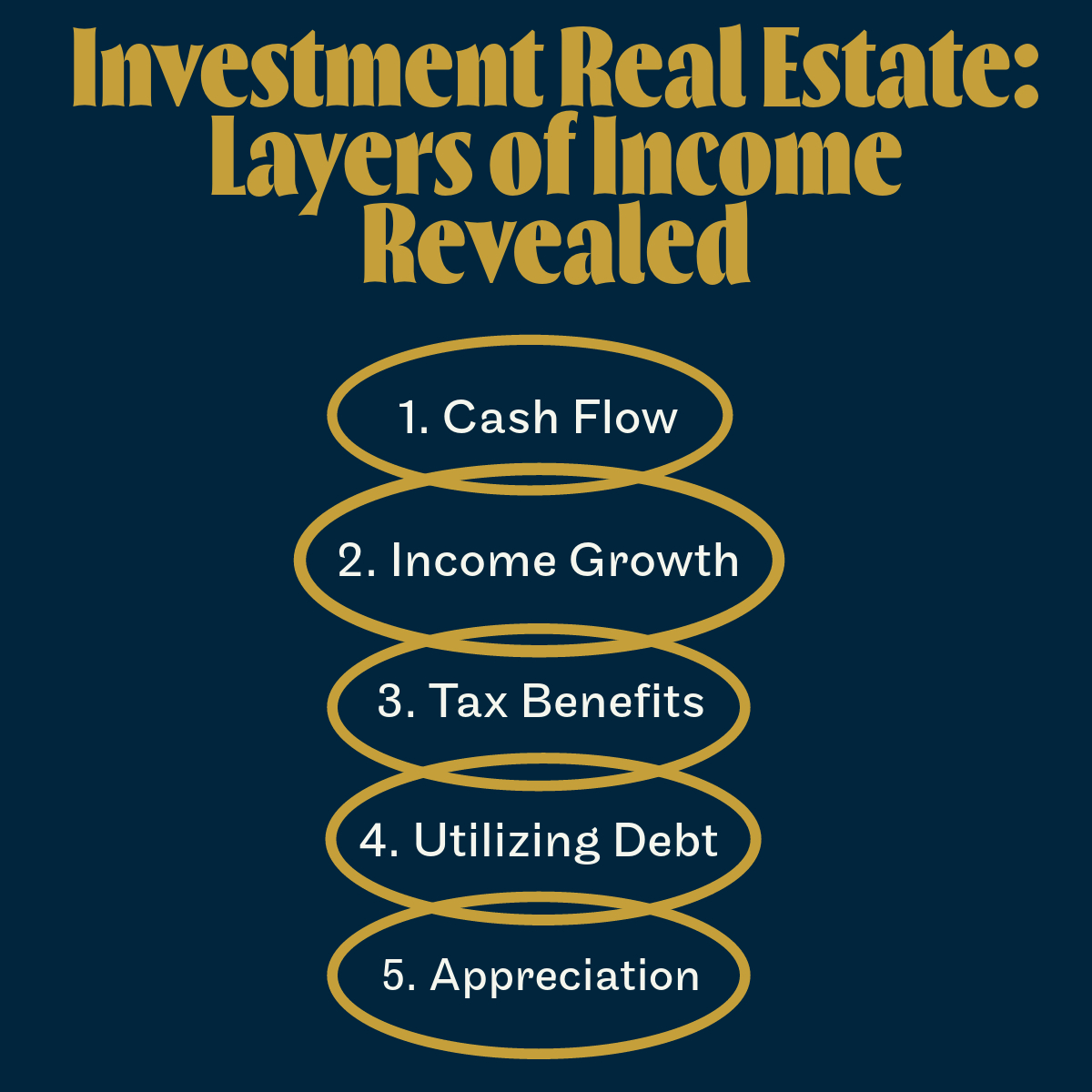
Key Takeaways
- Secure Return on Investment: Real estate offers stable and predictable cash flow, tangible asset security, and lower volatility than stocks or bonds, making it a reliable choice for investors seeking steady returns.
- Scheduled Income Growth: Investments in real estate benefit from scheduled annual rent increases, ensuring a growing income stream that also serves as a hedge against inflation.
- Tax Benefits: Real estate investing provides significant tax advantages, including deductions for depreciation, mortgage interest, and operating expenses, as well as potential capital gains benefits through 1031 exchanges and pass-through deductions.
- Utilizing Debt and Principal Reduction: Real estate allows the strategic use of debt to amplify returns and enable property control with a lower initial investment. At the same time, consistent loan repayments contribute to equity build-up and wealth accumulation.
- Steady Capital Growth: Real estate stands out for its dual capital growth strategy. It combines market-driven passive appreciation with active value addition through property enhancements and skilled management, offering a balanced and robust investment opportunity.

Introduction
While various investment avenues offer benefits, real estate stands out with its multifaceted potential for wealth generation. Unlike stocks or bonds, real estate provides tangible assets with multiple income streams. This guide unveils the unique layers of income specific to real estate investment, highlighting how each layer contributes to building a robust and resilient portfolio.
Secure Return on Investment
While stocks and real estate can be valuable components of an investment portfolio, they differ significantly in the predictability and stability of the income they generate. Real estate offers a more steady and predictable cash flow, a tangible asset, and a buffer against market volatility. These are significant advantages for investors seeking stability and predictability in their income streams.
Control Over the Investment: Unlike stocks or bonds, where investors are at the mercy of market conditions and company management, real estate investors have a high degree of control over their investment. They can improve the property, change rental terms, or redevelop the site to increase its value or income potential.
Asset Backing: Real estate investments are backed by a tangible asset. In the worst-case scenario, the property can be sold to recoup some, if not all, of the investment. This is not always the case with stocks or other financial instruments that can become worthless if the company goes bankrupt.
Lower Volatility: Generally, real estate markets are less volatile than stock markets. Property values don’t tend to swing as wildly as stock prices can. Although real estate markets can have cycles, the day-to-day or even month-to-month fluctuations are usually far less severe. This lower volatility can provide a more stable investment environment and be particularly appealing during times of economic uncertainty.
Appreciation Potential: Over time, real estate typically appreciates. This appreciation can provide a solid return on investment and contribute to the overall security of investing in real estate. Capital appreciation and regular rental income offer a dual-earning potential that is less common in other investment types.
Income Generation: Real estate can generate ongoing income through rent, providing investors a steady cash flow. This can be especially appealing for retirees or others looking for a reliable income stream. Generating rental income also helps cover the property’s maintenance costs and mortgage payments, making it a self-sustaining asset.
Scheduled Income Growth
Real estate investments stand out among various investment options for numerous reasons, with one significant advantage being the potential for scheduled annual rent increases. This feature is particularly beneficial in generating steady income growth and protecting the investment against inflation. Let’s delve into how this advantage positions real estate favorably compared to other investment types:
Predictable Income Stream: Real estate investments, particularly in residential or commercial rental properties, provide investors with a predictable and steady income stream through monthly rent payments. The scheduled annual rent increases, often stipulated in lease agreements, ensure that this income stream grows over time, enhancing the investment’s profitability.
Hedge Against Inflation: One of the inherent advantages of real estate is its ability to act as a hedge against inflation. As the cost of living increases, so do property values and rental income. Scheduled rent increases ensure that the income from a real estate investment keeps pace with or exceeds the inflation rate, maintaining or enhancing the purchasing power of the revenue generated.
Tax Benefits
Real estate investments are often considered beneficial compared to other assets due to their substantial tax benefits. Here are several key reasons why real estate investments can be tax-efficient.
Depreciation Deductions: Real estate investors can take advantage of depreciation, a non-cash expense, to reduce taxable income. Residential properties are typically depreciated over 27.5 years, while commercial properties are depreciated over 39 years. This means investors can deduct a portion of the property’s cost each year as a depreciation expense, thereby reducing the taxable income generated by the property.
Mortgage Interest Deductions: Interest on mortgage loans used to purchase or improve a rental property is usually tax-deductible. This deduction applies to the mortgage payment’s interest portion, which can significantly lower the investor’s taxable income.
Operating Expense Deductions: Investors can deduct ordinary and necessary expenses incurred for managing, conserving, or maintaining the rental property. These expenses include property management fees, maintenance, repairs, property taxes, insurance, and utilities.
Capital Gains Benefits: If a property is sold after being held for more than a year, the profits are subject to long-term capital gains tax, which is generally lower than the ordinary income tax rates. Additionally, real estate investors can use a 1031 exchange to defer paying capital gains taxes by reinvesting the proceeds from a property sale into another investment property.
Pass-Through Deduction: With the Tax Cuts and Jobs Act of 2017, real estate investors who operate through pass-through entities like LLCs, S Corps, or partnerships may qualify for a pass-through deduction, deducting up to 20% of their net rental income.
Debt and Principal Reduction
Real estate investments benefit from automatic principal reduction through consistent loan repayments. This process gradually builds equity, increasing the investor’s net worth independently of market volatility, providing a solid and tangible financial benefit.
Real estate investment holds a unique position in the spectrum of investment options, primarily due to the leverage or the use of debt it allows. Unlike many other investment types, real estate investments can use borrowed capital to increase the potential return on investment. This characteristic bestows several advantages:
Leverage to Amplify Returns: Real estate investors can use leverage (debt) to acquire properties with a relatively small initial investment. For example, purchasing a property often requires only a 20%-30% down payment, with the remainder financed through a mortgage. This means that investors can control 100% of the property and its potential appreciation and rental income for a fraction of the total price.
Maximizing Capital Efficiency: Using debt allows investors to spread their available capital across multiple properties rather than tying it up in a single investment. This diversification can reduce risk and increase the potential for returns, as investors can own and profit from several properties simultaneously.
Mortgage Interest Tax Deduction: The interest paid on debt used for real estate investments is often tax-deductible, reducing the net cost of borrowing. This can significantly improve the investment’s profitability, especially when compared to other investment types where the cost of capital is not tax-deductible.
Inflation Protection: Real estate often acts as a hedge against inflation. As inflation increases, so do property values and rental income. If an investor has fixed-rate debt, the actual cost of that debt decreases over time as inflation rises. This means the investor is paying back the debt with less valuable dollars, further increasing the investment’s profitability.
Equity Build-Up: With each mortgage payment, a portion goes towards reducing the principal amount owed. This means that every payment increases the investor’s equity in the property, acting as a form of forced savings. Over time, this can result in significant wealth accumulation.
Steady Capital Growth
Real estate offers the potential for capital growth through market trends and stands out for its historical pattern of steady appreciation over time. This growth is further amplified by tangible property improvements and skilled property management. Unlike other investment avenues where value appreciation is often left to the whims of external market forces, real estate provides a unique blend of passive and active growth strategies.
Real estate investment distinguishes itself prominently in the investment landscape, boasting a robust potential for capital growth firmly rooted in prevailing market trends. This sector is renowned for its historical pattern of consistent and steady appreciation over time, marking it a standout choice for investors seeking reliable growth. The inherent value of real estate is not solely tied to market dynamics; it is also significantly enhanced by tangible property enhancements and the application of expert property management techniques. These active strategies of value addition set real estate apart from other investment avenues, where the trajectory of value appreciation is frequently at the mercy of unpredictable external market forces.
Real estate emerges as a unique blend of stability and growth in the realm of investment. While most investment channels are predominantly passive, relying on market movements for appreciable growth, real estate offers investors a dual advantage. It allows for a passive appreciation through market trends and presents opportunities for active value addition and growth. This dual approach to growth, combining passive and active strategies, mitigates the inherent risks associated with market volatility and empowers investors with control and influence over their investment outcomes, a feature distinctly lacking in many other investment forms. Consequently, for those seeking a balanced and multifaceted investment opportunity, real estate presents a compelling proposition, outshining other avenues with its blend of stability, control, and potential for robust growth.
Conclusion
Investment real estate offers a unique combination of stable cash flow, proactive growth strategies, tax advantages, equity building, and capital appreciation, setting it apart from other investment forms. Mastering the layers of income in real estate enables investors to leverage these advantages, creating a diversified, resilient, and high-yield investment portfolio.










